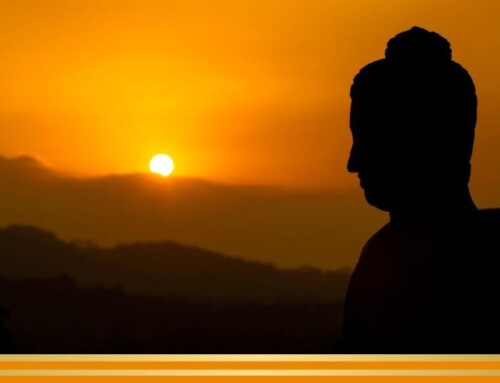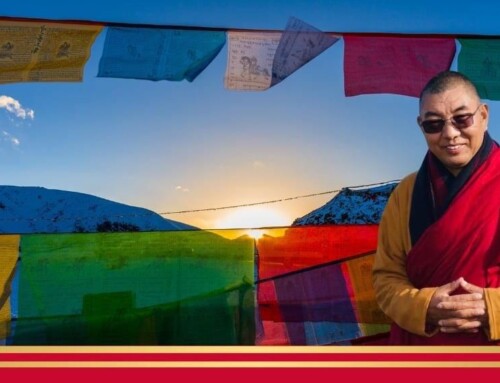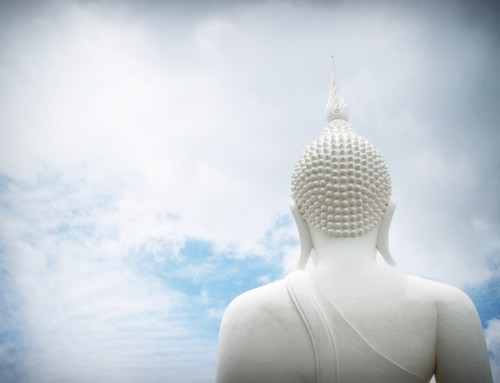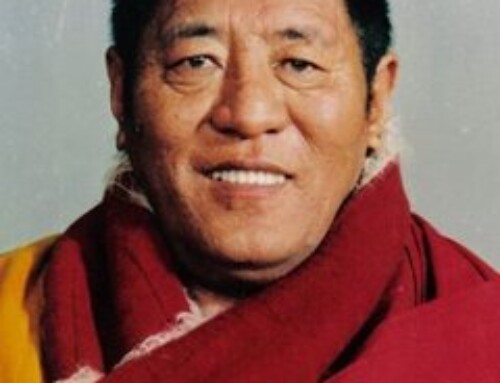As part of the Monday, April 10th, 2023 Chenrezig chanted prayers, Khenpo La shared a text called, “Advice for a Dying Practitioner,” by Dodrupchen Jigme Tenpe Nyima, kindly posted by Lotsawa House in English, Tibetan, and several other languages. (Many thanks to the translators!)
Here is the text in English:
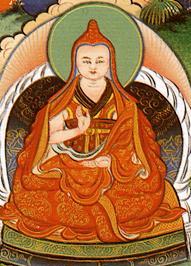 Advice for a Dying Practitioner
Advice for a Dying Practitioner
by Dodrupchen Jigme Tenpe Nyima
You will need to make preparations before the time comes to pass away. There are many aspects to this, but I will not go into too much detail here. Briefly, then, this is what you should do as you approach the time of death.
Think to yourself again and again: “Whether death comes sooner or later, ultimately there is no alternative but to give up this body and all my possessions. This is just how it is for the world as a whole.” Thinking along these lines, sever completely the bonds of desire and attachment. Confess all the harmful actions you have committed in this and all your other lives, as well as any downfalls or breakages of vows you may have incurred, wittingly or unwittingly, and make repeated pledges never to act in such a way in future.
Don’t feel nervous or apprehensive about death. Try instead to raise your spirits and cultivate a clear sense of joy, bringing to mind all the positive, virtuous things you have done in the past. Without feeling any trace of pride or arrogance, celebrate your achievements over and again. Dedicate all your merits and make repeated prayers of aspiration, so that in all your future lives you may be able to take to heart the complete path of the supreme vehicle, with the guidance of a virtuous spiritual friend, and with qualities such as faith, diligence, wisdom and conscientiousness—in other words, all the most perfect circumstances, both outer and inner. Pray too that you never fall under the influence of evil companions or destructive emotions.
The texts of the Vinaya explain that one of the principal causes for taking a supreme form of rebirth, as one who leads a disciplined life in the presence of the Buddha for example, is to make prayers and aspirations at the moment of death. This is why it is said that ‘whatever is the closest and whatever is the most familiar’ will have tremendous power.[1]
Any aspirations you make should be given additional impetus by making determined pledges such as this: “In all my lives, I will do all that I can to train on the path of emptiness with compassion as its very essence!” To appreciate the importance of this, consider how much more effective it is to say strongly to yourself, “I will wake up early in the morning!” than simply to make the aspiration “May I wake up early.”
In order to accomplish more easily whatever prayers you have made or intentions you have formed, it is profoundly beneficial to rely upon an embodiment of spiritual power. Bring to mind therefore the one for whom you have the greatest devotion, or to whom you feel the deepest connection through your practice, whether it is the great and glorious master of Oḍḍiyāna, Guru Rinpoche, or Noble Avalokiteśvara, the Lord of the World, and, with the confident trust that he or she is the embodiment of all the precious sources of refuge, pray one-pointedly for the fulfilment of your aspirations.
At the actual moment of death it will be difficult to gather sufficient strength of mind to meditate on something new or unfamiliar, which is why you must choose an appropriate meditation beforehand and train until you are familiar with it. Then, as you pass away, you should devote your thoughts to the meditation as much as you possibly can, whether it is remembering the Buddha, focusing on the feeling of compassion, cultivating the view of śūnyatā, or remembering the Dharma or the Saṅgha. In order for this to happen successfully, it is also important that you train yourself beforehand to think, “From now on, as I pass through this critical juncture of the time of death, I will not allow any negative thoughts to enter my mind.”
The saints of the past had a saying: “Better than plenty of virtuous activity done with a dull and clouded mind is just a single day’s virtuous action done with mental clarity.” As this says, if you practise all this having first made every effort to develop a sense of inspiration and joy, it will be that much more effective.
Even though it is difficult for the likes of me to benefit others, I will recite the verses of refuge and pray that in all your future lives you may follow the Mahāyāna teachings.
Written by the one called Fearless (Jigme).



